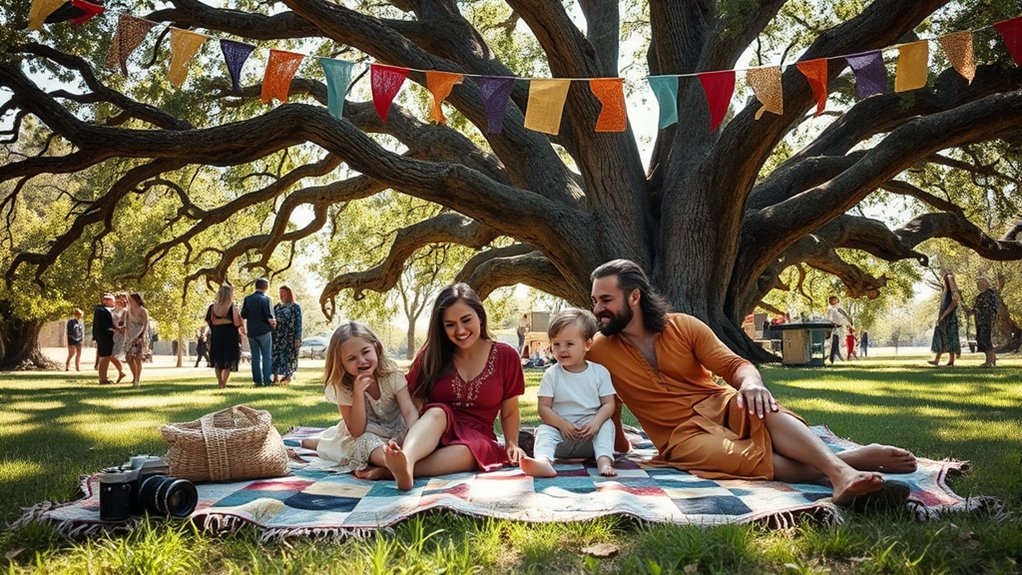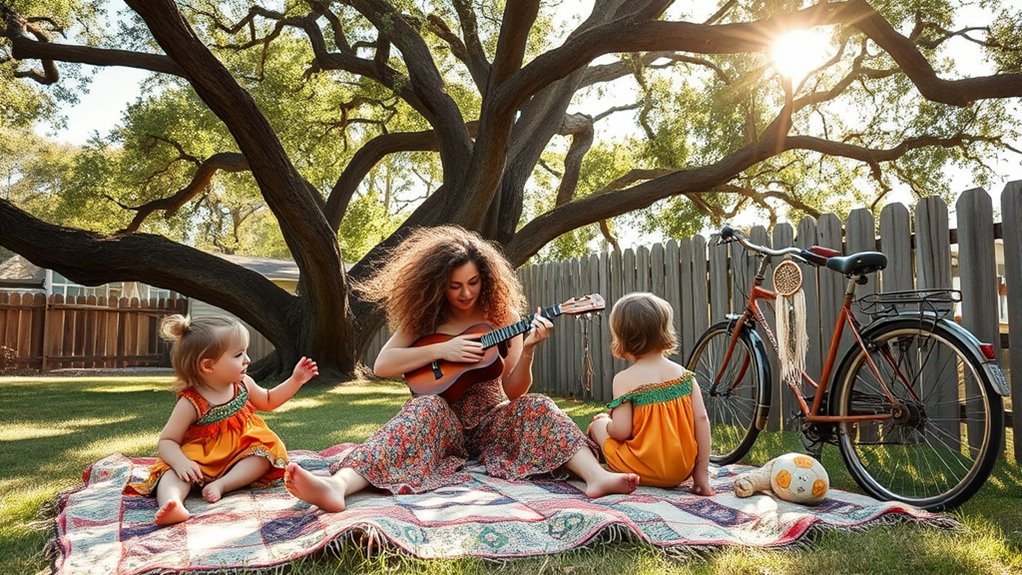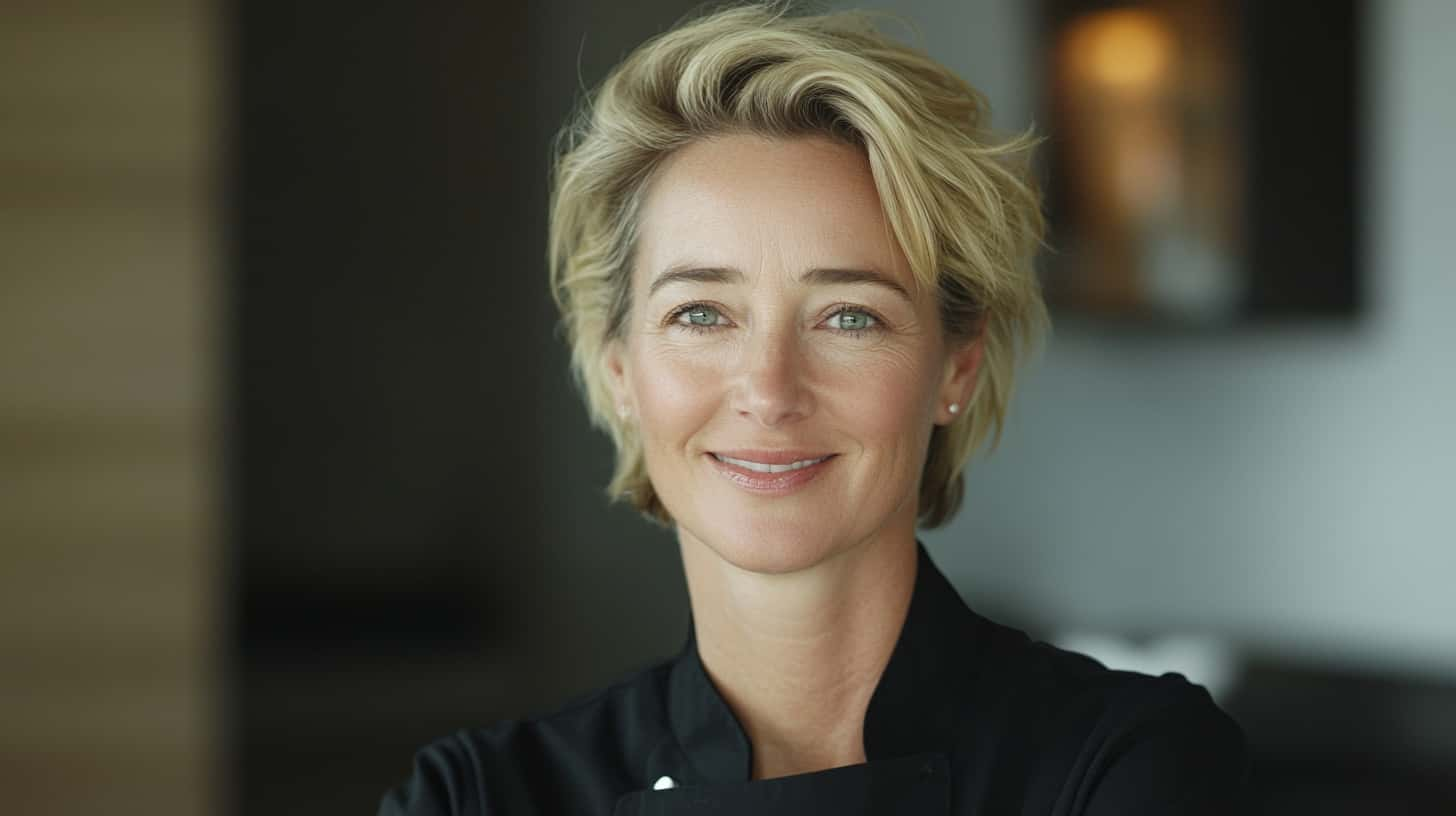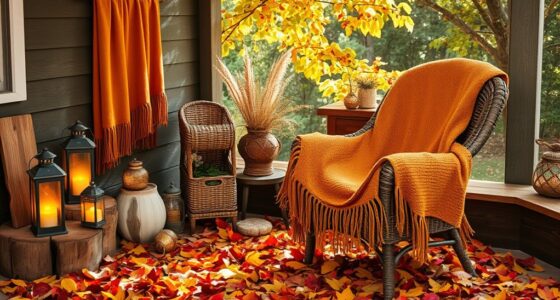Bohemian parenting invites you to embrace a free-spirited, unconventional approach by prioritizing creativity, emotional authenticity, and independence in your child’s development. You can foster a safe space for exploration, use mindfulness techniques to promote calmness, and choose eco-friendly toys to support sustainability. By moving away from strict schedules and encouraging genuine emotional expression, you nurture confident, resilient children. Continue exploring these ideas, and you’ll discover how to create a nurturing, free-spirited environment that aligns with your values.
Key Takeaways
- Emphasize emotional authenticity and open communication to nurture confident, self-expressive children.
- Incorporate mindfulness and meditation practices for calming and emotional resilience.
- Use eco-friendly, open-ended toys to encourage creativity and environmental consciousness.
- Adopt a relaxed, intuitive parenting style that respects children’s interests and promotes independence.
- Create a safe, loving environment that fosters vulnerability, self-expression, and a strong parent-child bond.

Bohemian parenting embraces a free-spirited, unconventional approach to raising children, prioritizing creativity, independence, and emotional authenticity. As a parent, you’re encouraged to foster an environment where your child feels safe to explore their passions and express themselves freely. Incorporating meditation techniques into your daily routine can help your little one develop emotional awareness and resilience. Simple practices, like breathing exercises or guided visualizations, can serve as calming tools during stressful moments or fluxes. You might find that these techniques not only benefit your child but also strengthen your bond, creating a peaceful, mindful atmosphere at home. Engaging in mindfulness practices can also serve as a relaxation technique that benefits both parent and child by reducing stress and fostering emotional well-being.
In keeping with the bohemian ethos, you’re likely drawn to eco-friendly toys that support sustainability and spark your child’s imagination. Instead of mass-produced plastic items, you opt for handcrafted, natural, and biodegradable toys that promote sensory development and environmental consciousness. Wooden puzzles, fabric dolls, or clay figures are perfect examples of eco-friendly toys that encourage open-ended play. These choices demonstrate your commitment to reducing your ecological footprint while nurturing your child’s creativity. Plus, eco-friendly toys tend to be safer and more durable, making them a practical investment over time.
You’re also encouraged to cultivate a relaxed, intuitive approach to parenting. Instead of rigid schedules and strict rules, you listen to your child’s needs and interests, allowing them to guide their own learning process. This fosters independence and a sense of ownership over their growth, helping them become confident and self-reliant. Incorporating nature into daily life is another cornerstone of bohemian parenting. Whether it’s a spontaneous walk in the woods or a backyard garden, spending time outdoors helps your child connect with the natural world and develop an appreciation for its beauty and fragility. This connection can also serve as a grounding force amid the busy, technology-driven modern environment.
Your parenting style probably emphasizes emotional authenticity, encouraging your child to express their feelings openly and honestly. You create a safe space for vulnerability, helping them understand that emotions are natural and valid. Through storytelling, art, or music, you nurture their inner voice and unique perspective. By blending mindfulness practices with eco-conscious choices and a flexible, affectionate approach, you’re fostering a nurturing environment where your child can thrive as a free spirit. This path may not always follow conventional rules, but it’s rooted in love, respect, and a deep commitment to raising emotionally intelligent, independent individuals in today’s world.
Frequently Asked Questions
How Do Bohemian Parents Handle Societal Pressure?
You handle societal expectations and peer influence by staying true to your values and trusting your instincts. Instead of conforming, you encourage your kids to embrace their uniqueness and question norms. When faced with pressure, you set boundaries and communicate openly, helping them develop confidence. You understand that societal pressures are strong, but by fostering independence and resilience, you empower your kids to navigate peer influence confidently and authentically.
What Are the Best Ways to Encourage Creativity in Kids?
Imagine opening a treasure chest where every gem is your child’s imagination. To encourage creativity, let them immerse themselves into artistic exploration without limits and indulge in imaginative play. Provide diverse materials, create a safe space for experimentation, and praise their ideas. Your encouragement acts as a gentle wind guiding their sails, helping them navigate their unique creative journey and discover their inner artist with joy and confidence.
How Can Parents Balance Independence With Safety?
You can balance independence with safety by practicing effective risk management and boundary setting. Encourage your kids to explore and try new things, but set clear limits to keep them safe. Communicate openly about potential dangers and involve them in decision-making. This way, they learn to assess risks while knowing boundaries are in place, fostering confidence and independence without compromising their safety.
What Traditions Are Common in Bohemian Parenting?
You might find that bohemian parents embrace unique traditions, blending hippie rituals with artistic expressions that create a vibrant, soul-stirring atmosphere. These parents often celebrate nature, hold spontaneous gatherings, and encourage creative self-expression. It’s like living in a kaleidoscope of colors and sounds. By integrating these traditions, you nurture independence and creativity, fostering a free-spirited environment where kids learn to trust their instincts and embrace their individuality.
How Do Bohemian Families Approach Education Choices?
You often choose alternative learning methods and prioritize experiential education for your kids, valuing hands-on experiences over traditional classroom settings. You believe in fostering curiosity and independence, encouraging your children to explore their interests freely. By integrating creative activities and real-world lessons, you help them develop critical thinking and problem-solving skills naturally. Your approach emphasizes flexibility, nurturing their unique talents and passions without being confined by conventional education standards.
Conclusion
Embrace your inner bohemian and let your kids flourish as free spirits in this modern world. Trust your instincts, nurture their creativity, and give them the freedom to explore like explorers charting new territories—think of them as digital-age Marco Polos. Remember, raising free-spirited children isn’t about strict rules but about guiding with love and patience. So, stay true to your vibe, and watch your little nomads blossom into confident, authentic souls.










